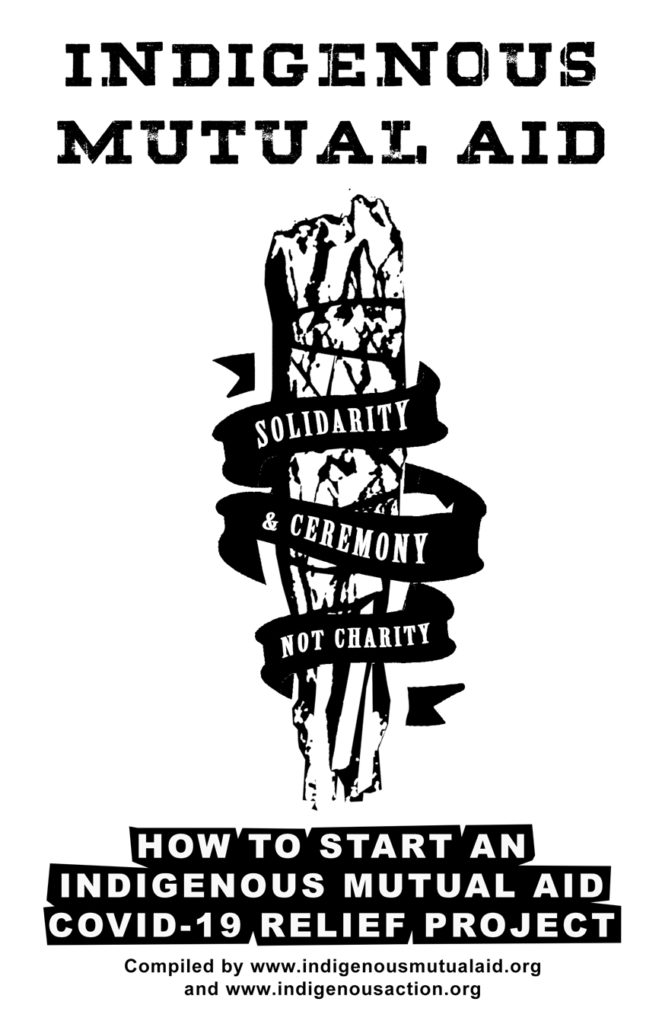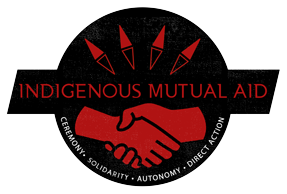Zine: How to start an Indigenous Mutual Aid COVID-19 Relief Project.
PDF Print/Imposed Zine Format (444KB)
Compiled by www.IndigenousMutualAid.org & www.IndigenousAction.org
Written Spring 2020, updated Spring 2021
 We decided to create this guide as we found that most resources currently available for COVID-19 Mutual Aid organizing were insufficient compared to discussions with other Mutual Aid projects and our own experiences working with two Indigenous Mutual Aid groups (Kinłani Mutual Aid & Navajo and Hopi Families COVID-19 Relief). Aside from this guide, we highly recommend that you talk directly with other Mutual Aid organizers to get a sense of what organizing frameworks may work best in your area. There is a directory here: www.mutualaiddisasterrelief.org/collective-care/
We decided to create this guide as we found that most resources currently available for COVID-19 Mutual Aid organizing were insufficient compared to discussions with other Mutual Aid projects and our own experiences working with two Indigenous Mutual Aid groups (Kinłani Mutual Aid & Navajo and Hopi Families COVID-19 Relief). Aside from this guide, we highly recommend that you talk directly with other Mutual Aid organizers to get a sense of what organizing frameworks may work best in your area. There is a directory here: www.mutualaiddisasterrelief.org/collective-care/
This is a living document. Please email edits or additions to indigenousmutualaid@protonmail.com.
Introduction
As our communities have a deep history with organizing to support each other in times of crisis, we already have many existing models of mutual aid organizing to draw from.
This has looked like a small crew coordinating their relatives or friends to chop wood and distribute to elders. It has looked like traditional medicine herbal clinics and sexual health supply distribution. It has looked like community water hauling efforts or large scale supply runs to ensure elders have enough to make it through harsh winters. It has looked like unsheltered relative support through distribution of clothing, food, and more.
Any time individuals and groups in our communities have taken direct action (not by relying on politicians, non-profit organizations, or other indirect means) and supported others–not for their own self-interests but out of love for their people, the land, and other beings–this is what we call “mutual aid.”
Though the term is credited to anarchist Peter Kropotkin — who established the analysis for his book “Mutual Aid: A Factor of Evolution” in part by observing Indigenous communities — Indigenous Peoples have long established practices of caring for each other for our survival, particularly in times of crisis. Mutual Aid is nothing new to Indigenous communities.
Indigenous Mutual Aid organizing challenges “charity” models of organizing and relief support that historically have treated our communities as “victims” and only furthered dependency and stripped our autonomy from us. We organize counter to non-profit capitalists who maintain neo-colonial institutions and we reject the NGO-ization and non-profit commodification of mutual aid.
We do not ask tribal governments or any other forms of settler governments for permission to advocate for and support our own communities — we do the work because it must be done. This is the very definition of Direct Action. We urge towards an organizing that is based on our cultural knowledge systems, that is anti-colonial, anti-capitalist, anti-heteropatriarchal, that abolishes white supremacy and that extends our ways of mutuality towards a future that honors our ancestors and coming generations. This is what “solidarity and ceremony not charity” means.
We highly recommend that before you start a Mutual Aid effort, research what work has already been done and if there are existing groups, see if there are ways you can join or enhance their efforts (check our directory here).
While this framework is focused on essential supply distribution such as PPE, food, water, etc, it can be easily adapted. Before we start organizing we should ask, “What are the most immediate needs of those most vulnerable in our community during this pandemic?”
Perhaps this is water infrastructure, home repair, feed for livestock, healthy traditional foods, etc. Our efforts should be configured to answer that question. We should review that question as conditions change and extend it beyond the immediate crisis as well.
READ THE WHOLE ZINE HERE: www.indigenousmutualaid.org/mutual-aid-101-organizing-guide/


No responses yet